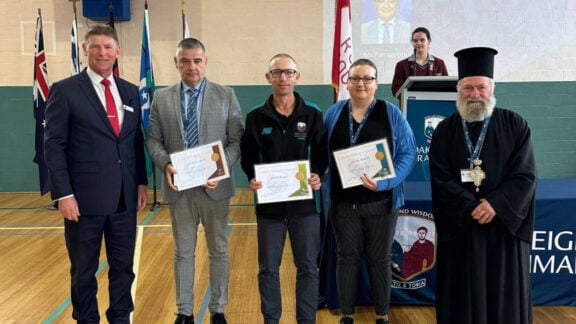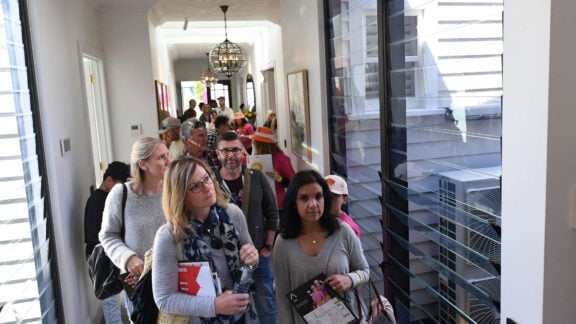The annual remembrance of OXI Day – the day that the then leader of Greece, Premier and former General Metaxas, rejected the Italian dictator Mussolini’s ultimatum in the early hours of the 28th October 1940 – is a day held dear by the Hellenes throughout the world.
But it has also been a day of remembrance for the wider Australian population. For Greece’s rejection of the Fascist threat was welcomed throughout Australia. Australia had been at war since Nazi Germany’s invasion of Poland in September 1939. The intervening years had seen Poland and then the Low Countries and France over-run. The news of Greece’s resistance to Italian aggression was a welcome one, sparking expressions of support throughout the Australian community.

Greece rejects Mussolini’s ultimatum
Mussolini’s ultimatum had been issued by the Italian ambassador to Greece, Emmanuele Grazzi, around 3am on that day. It demanded Greece allow Axis forces to enter Greek territory and occupy unspecified “strategic locations” or face war. The actual response of the Greek leader is reported to have been “then it is war.” But for the Greek people at the time, as they filled the streets, and ever since, the answer was simply No – Ohi!
The news hit Australia the next day. On the 29th October Melbourne’s Argus newspaper reported his proclamation to the people of Greece:
“I have informed Italy that I consider her demands and the manner in which they have been made a declaration of war against Greece. The time has come for all Greeks to fight to the death for all they hold dear.”

The Greek resistance to the Italian ultimatum and the resulting war were met with declarations of support from Britain and her Allies – including Australia. The Melbourne Argus reported on 31st October the British Prime Minister’s immediate declaration of support for Greek resistance. They went on to report Metaxas’ moving reply:
“Your words have resounded throughout Greece. We are going to march to final triumph with the serenity and resolution that led us to oppose our perfidious adversary’s aggression. With all confidence in our great and heroic Ally we are going to base a common certain victory on the eternal principles of morality, justice and liberty established 3,000 years ago on the sacred soil that we defending.”

British air and naval support was rushed to assist the Greek war effort. Royal Air Force were soon operating out of hastily built airfields far up in northern Greece providing valuable ground support for the Greek troops engaging the enemy on the ground. Royal Navy warships interdicted Italian naval support for its troops along the Greek coastline. British troops landed in Crete, the first contingent of what would grow into the Allied contribution to the defence of Greece and Crete against the coming German invasion. And in March 1941 Australian troops – in an iconic photograph by Australian war photographer Damien Parer – would be welcomed by Greek Evzones on the Acropolis above Athens.

Australian support for Greece
In Australia support for Greece filled the newspapers. Reports of the success of Greek forces on the Albanian front are reported with exhilaration. The Melbourne Argus reported on Thursday, October 31st, the mood in Athens:
“The appearance of Athens yesterday strongly reflected the determination of the Government and the army to resist the invader. Troops in full kit marched off to the front with mountain guns drawn by mules among their equipment. Tin-hatted air-raid wardens were doing their duty in the streets, and shop windows had been criss-crossed with tape, and cellars had been converted into shelters.”
Australian newspaper reports from the days following the outbreak of war reported the mobilisation of Australia’s Greek community in defence of Greece.
The Sydney community was reported to have gathered on the 28th October at the Athenian Club – “the meeting place of the Greek community” – were young members of the club shouted “Zito o polemos” – Hurrah for the war – and toasts were drunk to Metaxas and Britain. Two days later prayers for the Allied cause were offered at both Greek Orthodox Churches then established in New South Wales. The local Greek Consul, Vrisalis, pledged the support of the community for the Greek and Allied war effort.

Meanwhile in Melbourne similar mobilisations and declarations were taking place. The Melbourne Age reported that on the 29th October Victorian members of the Greek ex-Servicemen’s Legion of Australia, along with members of the Melbourne Greek community, held a meeting at the Greek Consulate where they pledged their support for Greece and declared that “if necessary, Greeks were prepared to return to their native land and fight.”
The Melbourne Argus also reported on the same day that the President of the Melbourne Greek Community, Raftopoulos, had expressed his confidence that the Greek people would do their best against the enemy, while the Greek Consul in Melbourne, Lucas, stated that while Greece was a peace-loving nation it would fight through to the end now that war had been forced on it by Italy’s aggression. The Consulate expressed its confidence that Italy would come to regret its aggression as Great Britain and her Allies would now bring their forces to bear on Italy in Greece’s defence. Lucas sent a telegram to the Greek Premier stating:
“… Greeks in Victoria with deep emotion watching developments in homeland. Taking immediate steps to assist financially in struggle. God Bless our soldiers.”
Two days later Melbourne’s newspapers carried the announcement that Melbourne’s Greek community would hold a meeting on Sunday, November 10th to discuss their plans “for providing financial assistance for the motherland in the war against Italy.”

These were the first steps in what would be a major fundraising effort involving the wider Australian population. These funds would be known as the Greek War Victims Funds, endorsed by the Australian Government and hundreds of Mayors. Fundraising days would become known as Greek Day. And in one famous act of support, the Greek community then resident in the Melbourne suburb of Prahran presented the Mayor of the City with a Greek flag to fly on Greek Day.
A lot of time for the Greeks
With the victory of the Greek Army in Albania and the fears of a looming German invasion to the north, Allied troops were soon being despatching to Greece to aid in its defence. From March 1941 these troops – including many Australian troops – began landing in Piraeus and moving north. Along with the 17,000 Australian soldiers were women of the Australian medical services as well as the sailors of a number of Royal Australian Navy warships who would play a key role in the coming Greek campaign. That campaign would end in tragic defeat as the Allied forces fell back in their fighting retreat across the length of Greece, making their way to the evacuation beaches and ports south of Athens and across the Peloponnese.

Yet just as the Australian public had joined in supporting Greece in 1940, so these Australian service men and women would encounter the active support of the Greek people. They cheered them as they arrived and they offered them food and comfort on their retreat. This feeling is clearly shown in the new documentary – Anzac The Greek Chapter – that I am glad to have worked on as Associate Producer. One of the most moving scenes in the documentary is that of the Greek campaign veteran Don Stephenson when – in recounting being offered cake by a Greek woman as he marched off in retreat – he states emotionally that everyone in the Australian 6th Division “has a lot of time for the Greek”. It will come as no surprise that this feeling was endorsed by the many veterans’ descendents who have attended the screenings of the documentary as part of the current Greek Film Festival.
Although the Greek victory in Albania would be followed by the devastating German invasion of Greece in April and subsequent four long years of occupation, the significance of the Greek Army’s defeat of the Italian invasion should not be underestimated. In October 1940, Greece was the sole ally on the continent of Europe of Britain and the Empire (as it was then known), including Australia. Greece’s victory over Italy was the first major victory against the Axis powers of the Second World War.

All Australians – whether Hellenes or not – have good reason to remember the day Greece said No. OHI Day commemorations will be held across Australia this weekend.
Jim Claven OAM is a trained historian, freelance writer and published author who has researched the Hellenic link to Australia’s Anzac tradition for many years. Amongst numerous other publications, Jim is the author of Grecian Adventure, a collection of articles on the Anzacs in the 1941 Greek campaign, and was Associate Producer for Anzac The Greek Chapter documentary, which premiered at the current Greek Film Festival. He can be contacted via email – jimclaven@yahoo.com.au.









